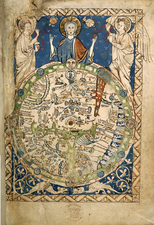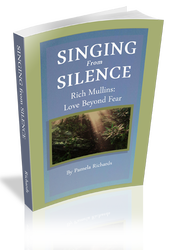
The art of mapping, recording and detailing known geography is cartography, best accomplished in ancient times by daylight. All maps of the medieval world began with Jerusalem as the center of the world and moved outwards toward parts unknown. On the vague corners of their maps, medieval cartographers inscribed, "Here be dragons." Back then, some of us thought we knew what dragons were, and where. At least in the light of day.
In light we find inspiration, illumination, life, love, truth. In darkness, we face mysteries. Here in the confines of time and space, we see through a glass, darkly. Hereafter we see face to face. Only then do we know fully, even as we are fully known.
In Signing from Silence, I told the story of my brief glimpse of "face to face." It probably amounted to no more than two minutes of clock time. There wasn't as much detail in my vision as that experienced by the little boy who nearly died, went to heaven for half an hour, and spent the next ten years teaching his father the theology he'd learned face to face. In my own two minutes of face to face time, all the barriers to love and forgiveness felt in a lifetime burned away. I only have a scrap of a map of heaven, but not being as advanced as a little child, I guess God knows it holds all the theology I can handle for now.
Not a map, but a dark mirror is the surface that shows us the mystery of the unknown. "Here be:" the unnameable, the unspeakable, the invisible. If light is the gateway to revelation, darkness is the womb of imagination and the unknown. In darkness we find shadows, moonlight, wolves, stars, and exultant choirs of angels who know that their effect on mankind is to provoke deep fear.
It is difficult for me to look back into that dark mirror now, to revisit my memories of Richard's anguish and fears. Back when Rich Mullins was alive, when he looked into that dark mirror, sometimes it was a werewolf he saw looking back at him. Not literally--that's a medical condition--but metaphorically. The darkness, anguish, the fear of repeating the primary loss that drove his destructive behavior appeared to Richard in that form.
Art arises so consistently from pain that some believe anguish is as indispensable a component of the creative process as fire is to alchemy. Pain, like the need to love and be loved, is a great universal. No one living escapes it--we can count on everyone to share it to some degree.
Richard seemed to experience more than his share of pain, and the fear of it. But when God gives us weightier talents like prodigy and creative genius, perhaps he gifts us too with deeper thorns of the flesh. . ."
Excerpt from the work in progress Let the Mountains Sing by Pam Richards
This is the fifth in a series of posts about the upcoming book, Let the Mountains Sing. For the sixth, click here.

 RSS Feed
RSS Feed